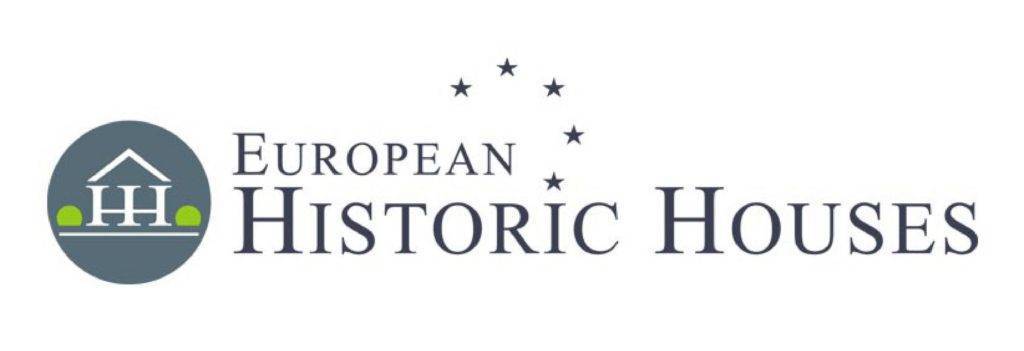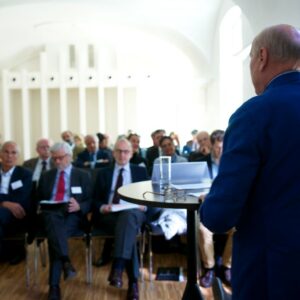

Rodolphe de Looz-Corswarem, President of the European Historic Houses Association, taking the floor at Schönbrunn Palace (Vienna)
Dear members
Dear readers
As you will notice in our newsletter, the year 2016 got off to a great start in many areas for the association.
We organised two important events. The first one in France (Fontainebleau) gathered together our Next Gen Group. The second one was our annual field trip with the Members of the Association and took place in Vienna and surroundings last month. Both events reassured me on the vitality and innovative thinking of our members, bringing at the forefront the essential role private heritage can bring to society at large in term of social inclusion and sustainable development.
However, it is the VAT issue that took most of our attention for the past month. We are indeed advising the EU authorities to apply a reduced VAT for the preservation of cultural heritage and restoration work as a strategic resource for a sustainable Europe. Hoping that EU authorities will consider the benefit that such measure could bring to the heritage sector; we are planning a new campaign which should continue after summer.
In fact, we are also looking forward to the next years, especially 2018. As you may know, it is the first time in history that the EU has declared a Cultural Heritage Year. We are already planning some initiatives with the Alliance 3.3 but more than ever, we need your advices and contributions. This way, we will be able to participate to the discussions framing your center of interest.
I wish you a good reading,
With all challenges Europe is facing today, we truly believe cultural heritage constitute a strategic resource for achieving the European Commission’s policy priorities. Our culture is a driving force in Europe in terms of cohesion and identity; values that are often felt to be missing in today’s criticisms.
On the occasion of the European Culture Forum organised in Brussels on 19-20 April 2016, Commissioner Tibor Navracsics – for Education, Culture, Youth and Sport – publicly announced that the European Commission will soon propose 2018 as European Year of Cultural Heritage (EYCH).
Conscious of the important role the young generation will play in the maintenance and the recognition of the private built heritage; the European Historic Houses Association is committing to prepare the Next Gen to inherit in the best possible conditions. This was the main topic and purpose of the weekend that took place in Fontainebleau (France). Rocked by the rhythm of visits from Mesnil-Voysin, Courances and Vaux-le-Vicomte, our young members (80 participants from 14 nationalities) participated actively to the conference and mutually shared their experience in a vibrant atmosphere.
The key to this weekend was the organization of an annual Next Gen conference meeting to focus specifically on succession planning for heritage property and the associated family business. The coordinator, William Cartwright-Hignett, assembled an ambitious program by bringing together speakers from very diverse backgrounds. From the family psychologist to the economist expert, we pointed out the urgent need for the young generation to speak frankly with their parents with regard to succession matters. However, there is no general solution that fits all. Each situation is very specific and the issue must be addressed on a case-by-case basis.
This more theoretical part has been followed by visits of private houses, which have experienced or are experiencing the same kind of challenges considered above. Through the different examples we faced, it became apparent that private ownership remains a demanding and arduous task even with an efficient management and a certain degree of recognition from the public society.
Nevertheless, we detected a true willingness and concerns about those issues from the Next Gen through their involvement, interest in the thematic and their keenness to move forward. On these good thoughts, the next meeting has therefore already been settled and scheduled for March 2017 in Italy. Be ensured that the European Historic Houses Association is looking forward to taking part to organization given the huge success of this year edition
In fact, we directly got into the heart of the event with a seminar, entitled “Preservation & Maintenance of Private Historic Houses: Smart Recipes & Good Practices”. Held in the Schönbrunn Palace, the discussion was animated by four panelists from very diverse backgrounds and specialties. They mostly talked about issues that Austrian owners of historic houses are facing nowadays in their struggle to maintain their heritage. If you want to know more, the seminar notes are available down here.
We visited the next day several private historic houses in the surroundings of Vienna. This allowed our members to discover the country’s culture and heritage as well as to learn about the national association’s concerns and difficulties. This was a good occasion for owners to show to the group the positive impact renovations have on the local and regional economy. We have also witnessed a real interest in preserving the family heritage for the future generations, which are keen to take an active part to the project.
On the 15th of February 2016, the European Historic Houses prepared a joint position following the VAT Action Plan adopted by the European Commission. We addressed a letter, together with our partner associations, to the President, Jean Claude Juncker and the Vice-Presidents as well as the Commissioner, Pierre Moscovici in order to make our voice heard. The same letter was addressed to the Dutch Presidency during the ECOFIN meeting of the EU Council which took place on the 22nd and 23rd of April 2016.
This was a first step from a long process that needs to be followed both at the European level and within Member States themselves. Indeed, taxation and VAT rates are particular issues that stays in the prerogative of the Member States and require uninamity at the level of EU Council.
At the time of writing, a second Coalition Position on VAT is getting prepared. A new and more elaborated position is being prepared to buttress the arguments in favour of a reduced VAT for the preservation of cultural heritage. This will keep the European Historic Houses Association and its coalition partners busy during summer.
